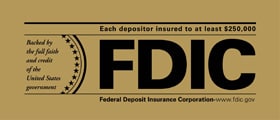Have you ever wondered what would happen to your money if your bank closes? Well your money may be insured either through the FDIC or NCUA.
Keep reading to find out what is insured and how to keep your money safe in the event of a loss.
 |
 |
 |
Differences Between FDIC and NCUA
 The Federal Deposit Insurance Corporation (FDIC) is an independent federal agency, hence the name, that protects customers’ deposits within an insured bank. FDIC insurance covers all deposit accounts, such as checking, savings, certificates of deposit and money market accounts. You as an account holder are insured up to $250,000 per institution under the FDIC insurance limits.
The Federal Deposit Insurance Corporation (FDIC) is an independent federal agency, hence the name, that protects customers’ deposits within an insured bank. FDIC insurance covers all deposit accounts, such as checking, savings, certificates of deposit and money market accounts. You as an account holder are insured up to $250,000 per institution under the FDIC insurance limits.
 The National Credit Union Administration (NCUA) has made their insurance very similar to what FDIC offers, but there are a few key differences. NCUA insurance covers regular shares and share draft accounts, which are specific to credit unions and do not exist at banks. Although they cover the same amount, the NCUA covers more accounts at a credit union, so you would be more likely to breach the $250,000 limit with a credit union. If you are interested in joining a credit union, be sure to check out our list of Best Credit Unions Anyone Can Join.
The National Credit Union Administration (NCUA) has made their insurance very similar to what FDIC offers, but there are a few key differences. NCUA insurance covers regular shares and share draft accounts, which are specific to credit unions and do not exist at banks. Although they cover the same amount, the NCUA covers more accounts at a credit union, so you would be more likely to breach the $250,000 limit with a credit union. If you are interested in joining a credit union, be sure to check out our list of Best Credit Unions Anyone Can Join.
Similarities Between FDIC and NCUA
While the FDIC and NCUA have their differences, they tend to operate in a similar fashion. Both the FDIC and NCUA are independent federal agencies that insure their customers’ deposits.
Legally, they can insure up to $250,000 per depositor, per institution. This means that, if the combined total balances of your accounts exceeds that value, that the institution cannot guarantee the safety of your money. These accounts include your standard deposit accounts, such as checking and savings, but also neither organization covers your bonds, stocks, mutual funds, life insurance policies, or annuities.
| Insured by FDIC or NCUA | Not Insured by FDIC or NCUA |
| Savings Accounts | Stocks |
| Checking Accounts | Mutual Funds |
| Money Market Accounts | Bonds |
| Certificates of Deposit | Annuities |
| Negotiable Orders of Withdrawal | Treasury or Municipal Securities |
| Cashier’s Check | Life Insurance Policies |
| Money Order | Contents of Safe Deposit Boxes |
While Credit Unions and Banks aren’t required to be insured by their respective insurance institutions, they should to stay relevant in the banking market. Consumers are less likely to sign-up with an uninsured bank or credit union, so these financial entities must stay insured.
What Coverages are Protected
Here is a list of what is insured by FDIC and NCUA:
| Type of Account | Description of Account | Coverage Limit |
| Single Ownership Accounts | All accounts with a single owner | $250,000 for all single-ownership accounts owned by the same person at one institution. |
| Joint Accounts | Accounts owned by two or more people with equal rights to withdraw money and no named beneficiaries. | $250,000 per account owner |
| Retirement Accounts | Traditional and Roth IRA accounts and KEOGH retirement accounts | $250,000 total for all IRAs and $250,000 for KEOGH accounts |
| Revocable Trusts | Accounts owned by one or more people that name one or more beneficiaries to receive the funds upon death of the owner | $250,000 per each named beneficiary |
| Irrevocable trusts | Accounts owned by one or more people that name one or more beneficiaries to receive the funds upon death of the owner | $250,000 per each named beneficiary |
As you can see from the table, certain accounts can be insured pass the single $250,000 limit if you meet the requirements.
By opening joint accounts for example, your insurance coverage increases per beneficiary. This is a good idea if you want to keep a large amount of money in a single account.
However, we do recommend you spread your money through different entities and accounts to diversify your account and minimize losses.
Summary
Keeping your money safe is what matters to you, and knowing which institution is crucial towards limiting the risks you take with your money. They operate in a similar manner, covering their consumers to the same amount, so the deciding factor is whether you are holding your money with a credit union or a bank, and which accounts you want to have.
If your current institution isn’t insured, you can create a new account and be rewarded as well. If you want to know more, be sure to check out our Best Bank Bonuses!



